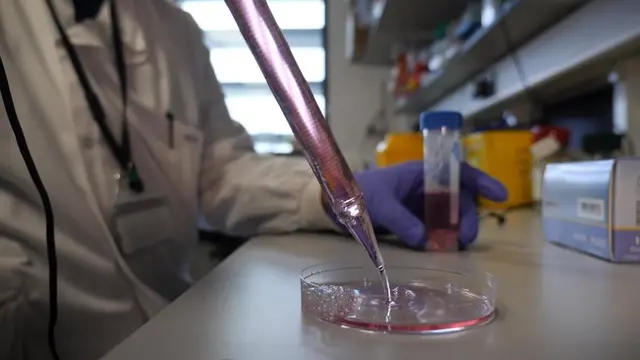The government is putting big bets on vaccines that may not work against the coronavirus, scientists have warned.
Around 90% of experimental vaccines never reach the clinic because of problems in development or manufacture.
But the government's Vaccines Taskforce has invested more than £100m in
COVID-19
vaccines being developed at Oxford University and Imperial College London.
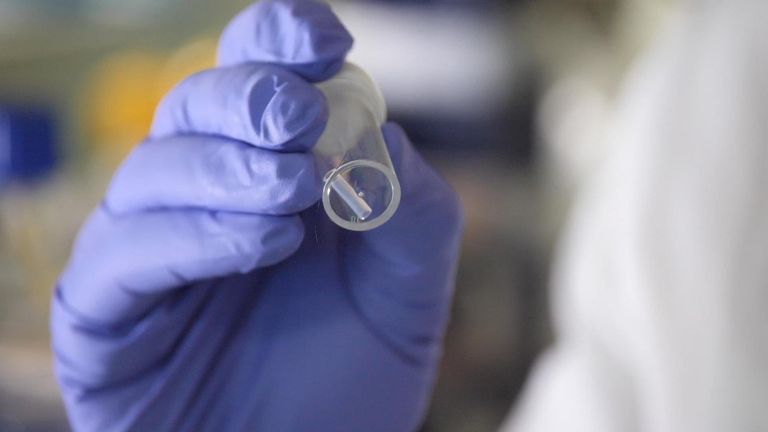
Image:The prototype is a tiny gold bullet coated in DNA
A separate team at Nottingham University say their
coronavirus
vaccine prototype has considerable advantages, but has been overlooked.
Lindy Durrant, professor of cancer immunotherapy at the university, said the government should keep its options open in case other vaccines fail to work.
"Please give us some money," she said. "We have an exciting approach. It could be the answer."
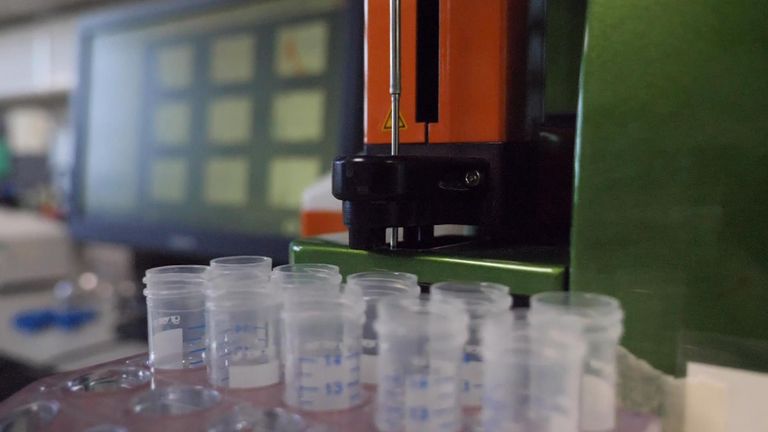
Image:The vaccine trains the immune system to attack virus proteins
Sky News was given exclusive access to the Biodiscovery Institute in Nottingham, where the vaccine - code-named SN11 - is being developed.
The prototype is a tiny - and harmless - gold bullet coated in DNA, which is fired under the skin by compressed gas.
First results from trials in mice show it provokes the immune system to make a high number of '"killer T-cells" that clear infections from the body.
"A T-cell can kill a virus very quickly and that's what our technology is all about: potent killer T-cells," said Professor Durrant.
The vaccine is being developed with the company Scancell. It uses the same technology in a highly effective vaccine against melanoma skin cancer.
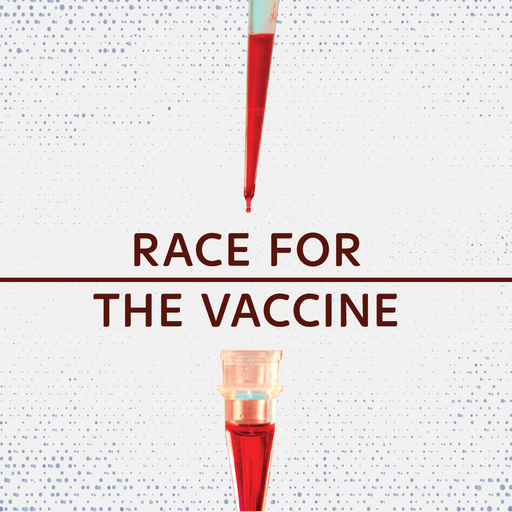
The race for a vaccine
**:: Listen to the Daily podcast on **
Apple Podcasts
**, Google Podcasts
, Spotify
, Spreaker
**
Tumour cells are so similar to normal tissue that the immune system doesn't recognise them as a threat.
But the vaccine generates T-cells that dramatically reduce the risk of patients relapsing.
Poulam Patel, professor of clinical oncology at Nottingham University, who led the clinical trials, said the success against cancer gave him confidence it would work against coronavirus.
He told Sky News: "Trying to find a vaccine against melanoma is a harder ask than a completely foreign invader.
"If it can do that for melanoma it's more likely to do it for a virus."
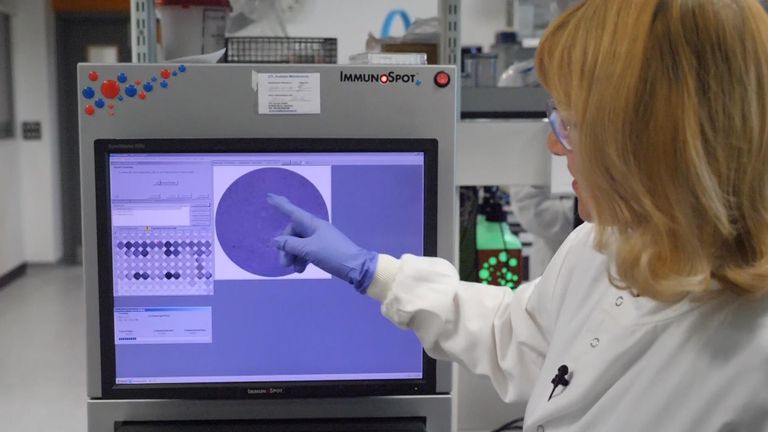
Image:The vaccine is being developed by Nottingham University
The T-cell technology leads to longer-lasting immunity than antibodies. It is also more likely to work in older patients, precisely those who need protection the most in the current pandemic.
According to the World Health Organisation, 10 vaccine candidates are in clinical trials.
They all target the protein spikes that the coronavirus uses to enter patients' cells.
But the Nottingham vaccine also trains the immune system to attack proteins at the core of the virus.
It's a back-up in case the virus mutates.
And because the inner proteins are similar to those in other coronaviruses, such as SARS, it could give protection if a related virus threatens a new pandemic.
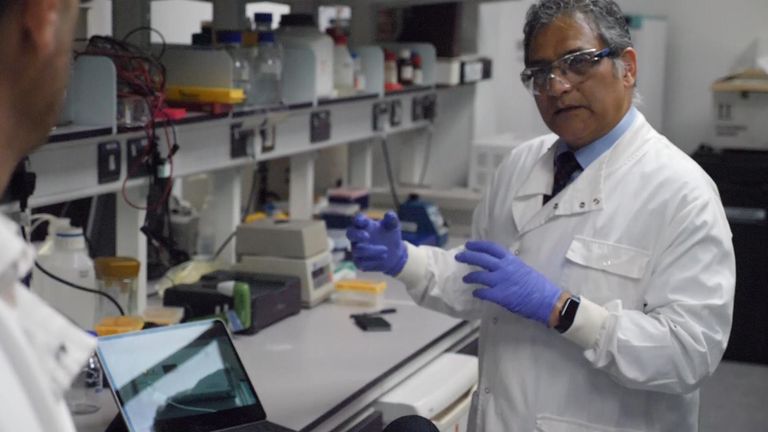
Image:Poulam Patel pointed to the vaccine's success against cancer
Dr Charlie Weller, head of vaccines at the Wellcome Trust, said until there is good clinical evidence to back a vaccine it's wise to spread your bets.
"The front runners don't necessarily mean they are the best options," she said.
"They are the first to get into clinical trial and give us data to understand the different approaches. We will learn a huge amount from them.
"But it doesn't mean they are the best. It means they are the first."
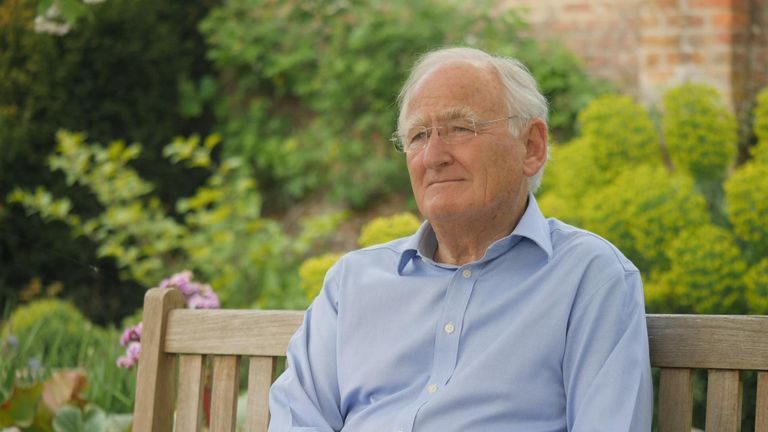
Why a COVID-19 vaccine may not be shared
Dr Weller said multiple vaccines are likely to be needed that work in different ways to end the pandemic.
The Nottingham scientists are about to start work with peptides - small proteins - to enhance the vaccine.
It would mean doing away with the gold pellet, but they hope it will still be the silver bullet against COVID-19.
 简体中文
简体中文

